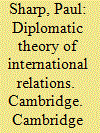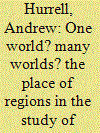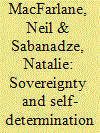| Srl | Item |
| 1 |
ID:
100917


|
|
|
|
|
| Publication |
Cambridge, Cambridge University Press, 2009.
|
| Description |
x, 339p.
|
| Series |
Cambridge studies in international relations
|
| Standard Number |
9780521757553
|
|
|
|
|
|
|
|
|
|
|
|
Copies: C:1/I:0,R:0,Q:0
Circulation
| Accession# | Call# | Current Location | Status | Policy | Location |
| 055559 | 327.2/SHA 055559 | Main | On Shelf | General | |
|
|
|
|
| 2 |
ID:
076522


|
|
|
|
|
| Publication |
2007.
|
| Summary/Abstract |
This article is a revised version of the 2006 Martin Wight Memorial Lecture and examines the placeof regional states-systems or regional international societies within understandings of contemporary international society as whole. It addresses the relationship between the one world and the many worlds-on one side, the one world of globalizing capitalism, of global security dynamics, of a global political system that, for many, revolves a single hegemonic power, of global institutions and global governance, and of the drive to develop and embed a global cosmopolitan ethic; and, on the other side, the extent to which regions and the regional level of practice and of analysis havebecome more firmly established as important elements of the architecture of world politics; and the extent to which a multiregional system of international relations may be emerging. The first section considers explanations of the place of regionalism in contemporary international society and the various ways in which the one world aff ects the many. The second section deals with how regionalism might best be studied. The final section analyses four ways in which regionalism may contribute to international order and global governance
|
|
|
|
|
|
|
|
|
|
|
|
|
|
|
|
| 3 |
ID:
124732


|
|
|
|
|
| Publication |
2013.
|
| Summary/Abstract |
This article discusses the historical evolution of norms of sovereignty, non-intervention, territorial integrity, and self-determination in international relations. It shows the degree to which their meanings and weight have varied and considers the bumpy historical relationship between international norms and practice. The twentieth century witnessed increasing tension between the hardening of sovereignty and non-intervention norms and the development of international human rights norms. The article then discusses normative inconsistencies and the variability of application of norms in practice in the post-Cold War era. It concludes by suggesting ways in which international society might mitigate these inconsistencies and the confusion that attends them
|
|
|
|
|
|
|
|
|
|
|
|
|
|
|
|
| 4 |
ID:
131413


|
|
|
|
|
| Publication |
2014.
|
| Summary/Abstract |
Arnold J. Toynbee (1889-1975) has long been neglected or discounted by scholars of international relations and historians of international thought. Yet his contributions to International Affairs, as well as his Surveys of international affairs and his A study of history demonstrate both his capacity for acute interpretation of contemporary events and the depth of his learning about past international societies. This article examines his analysis of mid-twentieth century international relations, that 'Time of Troubles' which he believed would only be escaped through a recovery of 'creativity' and profound change in the ways in which world politics were practised. It explores the foundations of his approach to the field, demonstrated both in his Surveys of international affairs and his twelve volume magnum opus, A study of history, as well as his essays in journals. It analyses his diagnosis of the causes of our contemporary 'Time of Troubles', in the light of past episodes in world history Toynbee thought analogous to that present condition of international relations. And it traces his retreat from political solutions to the challenges faced in the twentieth century and his movement towards religious responses as a putative alternative. It concludes by arguing that Toynbee deserves recognition, not simply as a pioneering world historian or a controversial interpreter of the politics of the Middle East, but as an acute commentator on the international relations of a troubled age.
|
|
|
|
|
|
|
|
|
|
|
|
|
|
|
|